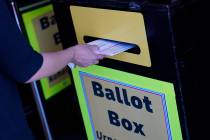EDITORIAL: Court says ‘dumping’ caused no harm
Improper patient discharges by the state Rawson-Neal Psychiatric Hospital in Las Vegas popularized a term befitting an interstate political and mental health scandal: “patient dumping.” The phrase evokes images of cruelty and harm.
But last week’s dismissal of a federal lawsuit brought by patient and civil rights advocates eviscerated the idea that the state’s mental health system, although undeniably broken, has victimized vast numbers of the vulnerable through a lack of treatment and coerced exile, and that members of this class are entitled to windfall judgments at the expense of the public.
“Patient dumping” became a regional story last year when the Sacramento Bee reported how James F. Brown had been discharged from Rawson-Neal and given a bus ticket to California’s capital, which he accepted and used, unaccompanied, despite having no family or support system in the city. Subsequent reports revealed that some 1,500 mental health patients had been given bus tickets to out-of-state destinations between 2008 and 2012, and that some of those discharges were insufficiently documented.
The state conducted an investigation into hospital practices that resulted in employee discipline, including terminations, and reformed discharge and travel procedures. Mr. Brown sued anyway, alleging multiple violations of his constitutional rights by various state agencies and employees.
On Feb. 13, as reported by the Review-Journal’s Yesenia Amaro, U.S. District Judge James Mahan rejected all of the claims.
“Plaintiff argues that the court should take an unprecedented view of the requirements of the Eighth Amendment, putting forward the perspective that Rawson-Neal staff ‘banished’ plaintiff by discharging him involuntarily,” Judge Mahan’s dismissal reads. Such an interpretation of the prohibition against cruel and unusual punishment “would effectively require hospitals to indefinitely provide free care to all patients to avoid ‘punishing’ them by forcing them out into the harsh existence of the real world.”
Mr. Brown’s claim that his discharge violated his Fourth Amendment right against unreasonable “seizure” was dismissed because he failed “to show that defendants utilized physical force or a demonstration of authority by providing him with transportation to Sacramento,” the court order reads. “There is no allegation that plaintiff was threatened with punishment if he did not travel to Sacramento.”
Encouraging a mentally ill person to travel on a bus unaccompanied is uncompassionate and risky, to be sure, but if no one’s there to force that person onto the bus, how can it be considered coercion?
Is Nevada’s mental health system an embarrassment? Absolutely. Repairing and upgrading it should be one of the highest priorities of the 2015 Legislature. As we’ve written before, the state lacks availability of basic treatment to the point that people who live here and can afford it can’t find adequate care in a timely fashion. The poor, the homeless and the most transient members of our population have no chance, making emergency rooms their destination of choice and affecting health care for everyone else.
Mr. Brown’s case was dismissed without prejudice; his attorneys have options to return to court. That said, unless new evidence reveals the state literally kicked patients to the curb and then dragged them onto a moving bus, or that a violent patient hurt fellow bus passengers, these issues should be debated before lawmakers instead of a judge.























